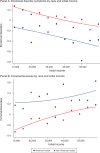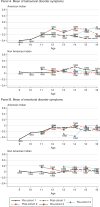How Does Household Income Affect Child Personality Traits and Behaviors?
- PMID: 29568124
- PMCID: PMC5860688
- DOI: 10.1257/aer.20160133
How Does Household Income Affect Child Personality Traits and Behaviors?
Abstract
We examine the effects of a quasi-experimental unconditional household income transfer on child emotional and behavioral health and personality traits. Using longitudinal data, we find that there are large beneficial effects on children's emotional and behavioral health and personality traits during adolescence. We find evidence that these effects are most pronounced for children who start out with the lowest initial endowments. The income intervention also results in improvements in parental relationships which we interpret as a potential mechanism behind our findings.
Keywords: D14; I12; I26; I31; I38; J13; J15.
Conflict of interest statement
The authors declare that they have no relevant or material financial interests that relate to the research described in this paper.
Figures











Similar articles
-
Young Adult Obesity and Household Income: Effects of Unconditional Cash Transfers.Am Econ J Appl Econ. 2013 Apr 1;5(2):1-28. doi: 10.1257/app.5.2.1. Am Econ J Appl Econ. 2013. PMID: 24707346 Free PMC article.
-
Context and sequelae of food insecurity in children's development.Am J Epidemiol. 2010 Oct 1;172(7):809-18. doi: 10.1093/aje/kwq201. Epub 2010 Aug 17. Am J Epidemiol. 2010. PMID: 20716700 Free PMC article.
-
Psychological studies of emotional changes in children undergoing dental treatment. 1. Changes in plethysmogram.Aichi Gakuin Dent Sci. 1991;4:15-34. Aichi Gakuin Dent Sci. 1991. PMID: 1819334
-
Associations of parental feeding practices with children's eating behaviors and food preferences: a Chinese cross-sectional study.BMC Pediatr. 2023 Feb 18;23(1):84. doi: 10.1186/s12887-023-03848-y. BMC Pediatr. 2023. PMID: 36800939 Free PMC article.
-
Assessment of young children's social-emotional development and psychopathology: recent advances and recommendations for practice.J Child Psychol Psychiatry. 2004 Jan;45(1):109-34. doi: 10.1046/j.0021-9630.2003.00316.x. J Child Psychol Psychiatry. 2004. PMID: 14959805 Review.
Cited by
-
Cooperation as a signal of time preferences.Proc Biol Sci. 2022 Apr 27;289(1973):20212266. doi: 10.1098/rspb.2021.2266. Epub 2022 Apr 27. Proc Biol Sci. 2022. PMID: 35473379 Free PMC article.
-
New Advances on an Old Question: Does Money Matter for Children's Outcomes?J Econ Lit. 2024 Sep;62(3):891-947. doi: 10.1257/jel.20231553. J Econ Lit. 2024. PMID: 39679128 Free PMC article.
-
Environmental adversity is associated with lower investment in collective actions.PLoS One. 2020 Jul 30;15(7):e0236715. doi: 10.1371/journal.pone.0236715. eCollection 2020. PLoS One. 2020. PMID: 32730312 Free PMC article.
-
The impact of agricultural disasters on child development in rural China.Front Public Health. 2022 Nov 2;10:952734. doi: 10.3389/fpubh.2022.952734. eCollection 2022. Front Public Health. 2022. PMID: 36408025 Free PMC article.
-
Childhood environmental adversity is not linked to lower levels of cooperative behaviour in economic games.Evol Hum Sci. 2021 Mar 17;3:e29. doi: 10.1017/ehs.2021.21. eCollection 2021. Evol Hum Sci. 2021. PMID: 37588553 Free PMC article.
References
-
- Akee Randall, Copeland William, Costello E Jane, Simeonova Emilia. How Does Household Income Affect Child Personality Traits and Behaviors?: Dataset. American Economic Review. 2018 https://doi.org/10.1257/aer.20160133. - DOI - PMC - PubMed
-
- Akee Randall KQ, Taylor Jonathan B. Social and Economic Change on American Indian Reservations: A Databook of the US Censuses and American Community Survey, 1990–2010. Sarasota, FL: Taylor Policy Group, Inc.; 2014.
Grants and funding
LinkOut - more resources
Full Text Sources
Other Literature Sources
